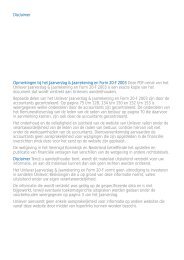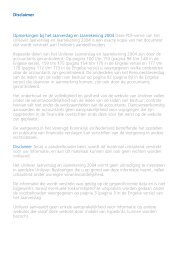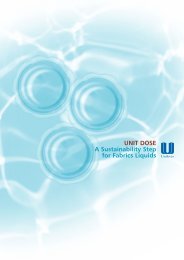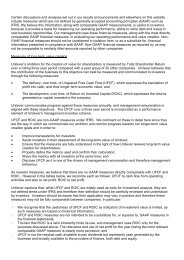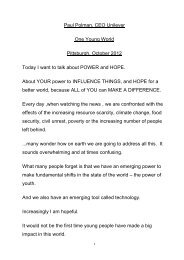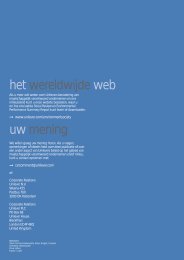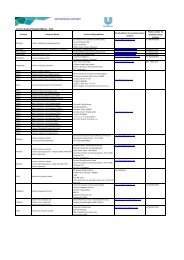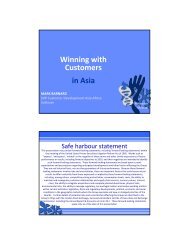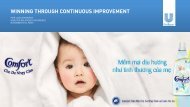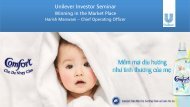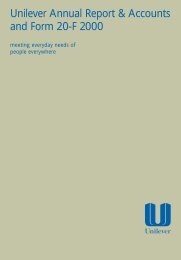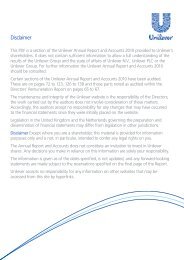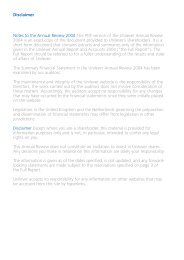Unilever Sustainable Living Plan Progress Report 2011
Unilever Sustainable Living Plan Progress Report 2011
Unilever Sustainable Living Plan Progress Report 2011
Create successful ePaper yourself
Turn your PDF publications into a flip-book with our unique Google optimized e-Paper software.
THE conTExT<br />
the world faces<br />
unprecedented challenges<br />
Population has<br />
passed 7 billion<br />
and is growing by 77 million a year<br />
climate change<br />
is accelerating<br />
Water is scarce –<br />
2.8 billion people live in<br />
water-stressed regions<br />
Food production<br />
has to increase by 70%<br />
to meet global demand in 2050<br />
obesity and<br />
under-nutrition<br />
continue to rise<br />
We are burning up<br />
resources at the<br />
rate of 1.5 planets<br />
according to WWF’s <strong>Living</strong> <strong>Plan</strong>et Index<br />
contents<br />
1 Introduction<br />
2 Building a sustainable business<br />
3 <strong>2011</strong> highlights<br />
4 Our impacts across the value chain<br />
6 The <strong>Unilever</strong> <strong>Sustainable</strong> <strong>Living</strong> <strong>Plan</strong><br />
8 Summary of progress: <strong>2011</strong><br />
Equivalent to a city<br />
the size of London<br />
being created every<br />
six weeks<br />
Heading towards<br />
a temperature<br />
rise greater than<br />
2 degrees<br />
2 billion lack access<br />
to safe drinking water<br />
We have to produce<br />
as much food in the<br />
next 40 years as we<br />
have in the last 8,000<br />
1 in 10 of the adult<br />
population is obese<br />
while 1 billion people<br />
go hungry<br />
If everyone lived<br />
like an average<br />
European, we would<br />
need three planets<br />
10 n Health and hygiene<br />
14 n Nutrition<br />
18 n Greenhouse gases<br />
22 n Water<br />
26 n Waste<br />
30 n <strong>Sustainable</strong> sourcing<br />
34 n Better livelihoods<br />
36 n People<br />
<strong>Unilever</strong>’s response to<br />
these global challenges<br />
With products on sale in over 190 countries,<br />
<strong>Unilever</strong> is confronted daily by the reality of poor<br />
hygiene, poor nutrition, water scarcity and the<br />
impact of a changing climate on the farmers<br />
who supply us. For 20 years we have been taking<br />
action to meet these challenges.<br />
1995 Started a <strong>Sustainable</strong> Agriculture<br />
Programme for our suppliers and<br />
an eco-efficiency programme for<br />
our factories<br />
1996 Co-founded the Marine Stewardship<br />
Council with WWF<br />
2000 Began work, with Greenpeace, to<br />
remove HFC refrigerants from our<br />
ice cream freezers<br />
2002 Lifebuoy soap’s campaign to raise<br />
awareness of the importance of<br />
handwashing was launched<br />
2003 Co-founded the Roundtable on<br />
<strong>Sustainable</strong> Palm Oil<br />
Established our Nutrition<br />
Enhancement Programme<br />
2007 Committed to source tea<br />
sustainably<br />
2008 Committed to source all palm oil from<br />
certified sustainable sources by 2015<br />
2010 Leading advocate of the Consumer<br />
Goods Forum’s commitment to<br />
eliminate deforestation from our<br />
supply chain<br />
Proud as we are of this work, we know that<br />
we have much more to do if we are to live up<br />
to the scale of the challenges. That is why<br />
we launched the <strong>Unilever</strong> <strong>Sustainable</strong> <strong>Living</strong><br />
<strong>Plan</strong> in november 2010 – the next step on our<br />
sustainability journey.<br />
38 External commentary<br />
40 Verifying our approach



